Cop27: members ‘deeply disappointed’ by summit outcomes despite historic loss and damage fund – live | Cop27
International media response so far has been mixed
It’s fair to say that so far the reaction to the cover text produced at Cop27 is mixed. While most celebrate the wins – in particular the establishment of a loss and damage fund – there is a sense that the final deal was a missed opportunity, and that time is running out.
The Washington Post in the US notes the significance of the creation of the loss and damage fund, in particular for the US. “Negotiators reached a deal on a “loss and damage fund” that represented a significant shift for US leaders, who have long feared such payments could make the nation liable for huge sums, given its historical contribution to emissions. But the Biden administration could no longer resist in the face of possible global condemnation at this year’s UN. climate change conference, known as Cop27.”
The Wire in India reports: “Countries adopted a hard-fought final agreement at the Cop27 climate summit early on Sunday that sets up a fund to help poor countries being battered by climate disasters – but does not boost efforts to tackle the emissions causing them. The session first swiftly approved the text’s provision to set up a ‘loss and damage’ fund to help developing countries bear the immediate costs of climate-fuelled events such as storms and floods.
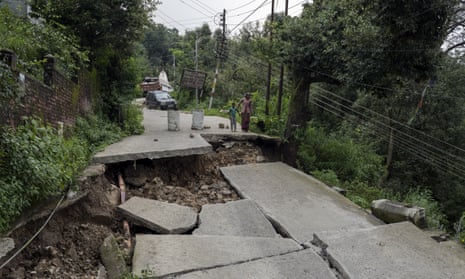
“But it kicked many of the most controversial decisions on the fund into next year, when a “transitional committee” would make recommendations for countries to then adopt at the Cop28 climate summit in November 2023. Those recommendations would cover “identifying and expanding sources of funding” – referring to the vexed question of which countries should pay into the new fund.”
El Pais in Spain reports the lack of ambition on 1.5C which has troubled many observers, referencing that many had hoped to get large carbon emitters like China, the “world’s leading emitter” to increase their reduction commitments. According to El Pais, this was what particularly held up the summit – the EU was not able to get its demands for more ambition through in the end.
Key events
The co-leader of the UK’s Green Party Adrian Ramsay is pointing out that while the establishment of the loss and damage fund is an important fund: “However, the fund is currently empty and we now need rich countries like the UK to step up, honour their commitment to this fund and pay for the harm they have inflicted through historical emissions.
“But the real failure at Sharm el-Sheikh was that no significant progress has been made in commitments on fossil fuels, which is unsurprising given the hundreds of fossil fuel lobbyists who were active inside the negotiation. In terms of the commitment to eliminating fossil fuels from the global economy, COP27 represents a backward step.”
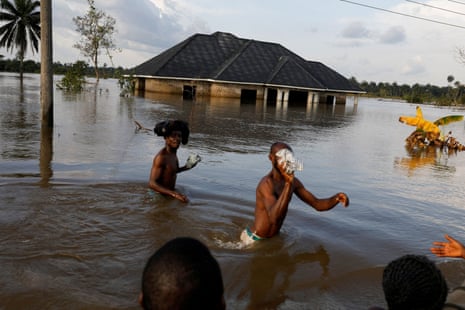
The reactions from climate justice organisations have been tempered by disappointment, too.
Lidy Nacpil, Asian Peoples Movement on Debt and Development, says: “We welcome an initial partial win on Loss & Damage Fund – it is there but buried with other ‘financial arrangements.’ And this win is overshadowed by lack of progress on fossil fuel phase-out and the continued inclusion of false solutions, which means more loss and damage! Lack of progress on fossil fuel phase-out shows the hypocrisy of governments of rich countries in their blah blah blah about keeping global temperature rise to below 1.5 degrees, and the corporate capture of the Cop by the fossil fuel industries. We need to escalate even more our struggles – in our countries and international arenas! Onwards!”
Asad Rehman, of War on Want, who has been such a powerful voice in the movement, said: “We leave the summit with a glimmer of hope that the establishment of a Loss and Damage Fund will provide much needed support to those on the frontlines of the climate catastrophe. It’s a small step, a critical one, but an empty fund means nothing. Rich countries who continue to pollute must now provide real finance to the fund.
Have left way too many Climate Summits feeling deflated & angry at rich countries divide & rule tactics that let them escape any responsibility for the crisis they have caused. Today I savour a hard fought victory made possible only because of the power of our movements 👏🏾👏🏾✊🏿✊🏾 pic.twitter.com/vcpl4KmX7u
— asad rehman (@chilledasad100) November 20, 2022
“This historic victory was only made possible because of people power. The unprecedented pressure by climate justice groups and the refusal of developing countries to be bullied or divided, dragged rich countries kicking and screaming across the line.”
But, he cautioned, people were also “bitter at the refusal of the rich to cut their emissions, and shift away from their addiction to fossil fuels. This continues to be a life and death fight for the future of humanity. But the growing power of climate justice movements is sending a warning to rich countries that we are not, and never will be defeated.”
Avinash Persaud, special climate envoy to PM Mia Mottley of Barbados, sees this as a “small victory for humankind”.
“It’s been agreed. I can now say and be quoted: we have a historic decision to establish a loss and damage fund for countries acutely impacted by the warming climate. It was the result of the strong leadership by the alliance of small Island states with an amazing degree of solidarity shown by the rest of the world, from the major industrialising developing countries and the developed ones. It is a small victory for humankind. Now we need to redouble efforts behind an energy, transport and agriculture transition that will limit these climate losses and damages in the future.”
And Kathy Jetnil-Kijiner, climate envoy from the Marshall Islands, said:
“I’m proud I got to be here to witness this happen and contribute in a small way. Worn out but so worth it to protect already disappearing islets, shorelines and culture. So many people all this week told us we wouldn’t get it. So glad they were wrong.
“I wish we got fossil fuel phase-out. The current text is not enough. But we’ve shown with the loss and damage fund that we can do the impossible. So we know we can come back next year and get rid of fossil fuels once and for all.”
More reaction from some of the key players here:
International media response so far has been mixed
It’s fair to say that so far the reaction to the cover text produced at Cop27 is mixed. While most celebrate the wins – in particular the establishment of a loss and damage fund – there is a sense that the final deal was a missed opportunity, and that time is running out.
The Washington Post in the US notes the significance of the creation of the loss and damage fund, in particular for the US. “Negotiators reached a deal on a “loss and damage fund” that represented a significant shift for US leaders, who have long feared such payments could make the nation liable for huge sums, given its historical contribution to emissions. But the Biden administration could no longer resist in the face of possible global condemnation at this year’s UN. climate change conference, known as Cop27.”
The Wire in India reports: “Countries adopted a hard-fought final agreement at the Cop27 climate summit early on Sunday that sets up a fund to help poor countries being battered by climate disasters – but does not boost efforts to tackle the emissions causing them. The session first swiftly approved the text’s provision to set up a ‘loss and damage’ fund to help developing countries bear the immediate costs of climate-fuelled events such as storms and floods.

“But it kicked many of the most controversial decisions on the fund into next year, when a “transitional committee” would make recommendations for countries to then adopt at the Cop28 climate summit in November 2023. Those recommendations would cover “identifying and expanding sources of funding” – referring to the vexed question of which countries should pay into the new fund.”
El Pais in Spain reports the lack of ambition on 1.5C which has troubled many observers, referencing that many had hoped to get large carbon emitters like China, the “world’s leading emitter” to increase their reduction commitments. According to El Pais, this was what particularly held up the summit – the EU was not able to get its demands for more ambition through in the end.
More reaction coming in.
Ruth Townend, research fellow on the environment and society programme at Chatham House, got straight to the point. She said: “World governments have, at most, three years to bend the curve on emissions, and nothing short of transformational change to energy, transport and food systems, the global financial architecture and the way individuals live their lives, can achieve this.
“In Sharm-el-Sheikh, precious time and opportunity was squandered. Governments can still head the signals of change coming out of Cop27 through ambitious national action in the year ahead, coming into Cop28 next year prepared to take transformative multilateral action where it matters. The future of the world’s citizens, you, me, our children and grandchildren, rests firmly on their shoulders.”
Katie White, executive director of advocacy and campaigns at WWF, said: “While a deal on loss and damage finance is a positive step, it risks becoming a down payment on disaster unless emissions are urgently cut in line with the 1.5C goal. By refusing to phase out fossil fuels, governments have failed to reach a more ambitious agreement than in Glasgow last year and put our health and security at risk.
“As attention turns to the Cop15 biodiversity summit in Montreal next month, the UK government must lead from the front in securing a gamechanging global deal to reverse the loss of nature by 2030 and bring our world back to life.”
‘Nature-based solutions’ included in the cover decision for first time
Leo Hickman, of Carbon Brief, has pointed out that for the first time ever, a Cop decision includes “nature-based solution” and a dedicated section on forests. This is of course excellent news.
For the first-time ever – it was removed at last moment in Glasgow – a COP cover decision includes the term “nature-based solutions” – and a dedicated section on “forest” pic.twitter.com/e73gmSfIxu
— Leo Hickman (@LeoHickman) November 20, 2022
He has also spotted “food” in there and believes this is the first time, too.
The wording is quite opaque, however, and does not openly acknowledge the role that farming systems play in producing carbon emissions. The text acknowledges that “the impacts of climate change exacerbate the global energy and food crises, and vice-versa”.
It talks about food security, and “the particular vulnerabilities of food production systems to the adverse impacts of climate change”.
The only way to survive an all-nighter at Cop27 – the power nap. With the closing plenary only starting in the middle of the night, here is a brief photographic guide to the tactics adopted by some delegates in order to make it to dawn.
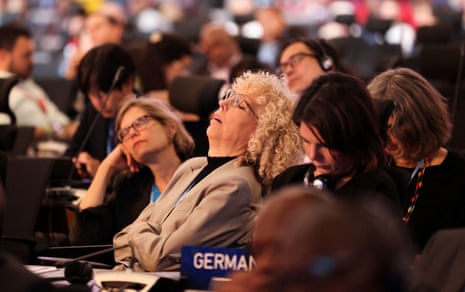
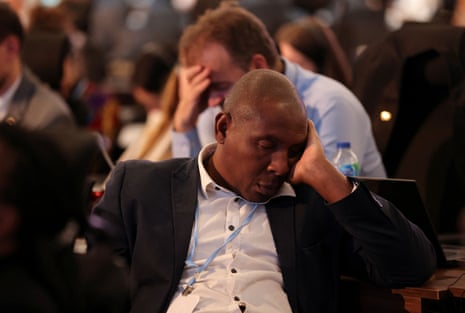
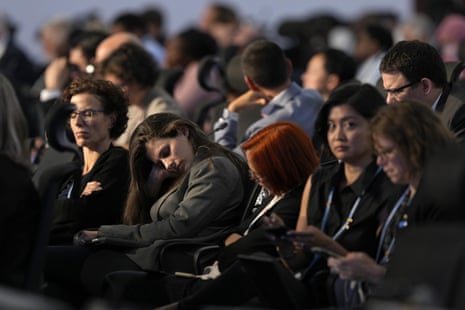
Criticism of the Egyptian management is surfacing
Throughout the conference there has been criticism of the way it was being managed by the Egyptian presidency. At some points it looked as if they were moving far too slowly and the last couple of days they were reported to be following procedures that were far from transparent, which meant it was difficult for delegates to be sure that everyone was having the same conversation.
Joe Lo of Climate Home is reporting that Annalena Baerbock, the German foreign minister, issued a statement accusing the presidency of “stonewalling and organisational shortcoming”, and said that only a progressive trans-continental alliance prevented “utter failure”.
In a statement, German foreign minister Annalena Baerbock accused the Egyptian presidency of “stonewalling and organisational shortcomings” and said that only a progressive trans-continental alliance prevented “utter failure” #COP27
— Joe Lo (@joeloyo) November 20, 2022
They might argue, however, that they were balancing some very conflicting demands. Sameh Shoukry, the Egyptian foreign minister and president of the summit, says: “In the end we delivered. We listened to the calls of anguish and despair.”
Friends of the Earth International gave a qualified welcome to the news. Sara Shaw said: “It is a relief that the Loss and Damage fund has finally been established, after decades of struggle. But, right now, it is an empty fund, and we have a huge challenge ahead to ensure that developed countries contribute to it, in line with justice and equity. We must not see a repeat of the abysmal performance of rich countries failing to provide the already inadequate $100bn a year promised over a decade ago.”
Babawale Obayanju, of Friends of the Earth Africa, added: “The fact that the outcome only talks about ‘phasedown of unabated coal power’ is a disaster for Africa and for the climate. Oil and gas must be also be phased out, swiftly and fairly. One small word, ‘unabated’, creates a huge loophole, opening the door to new fossil-based hydrogen and carbon capture and storage projects, which will allow emissions to continue. We don’t need more gas extraction in Africa, devastating our communities for the benefit of rich countries and corporations. What we needed from Cop27 was agreement to a rapid, equitable phase out of all fossil fuels.”
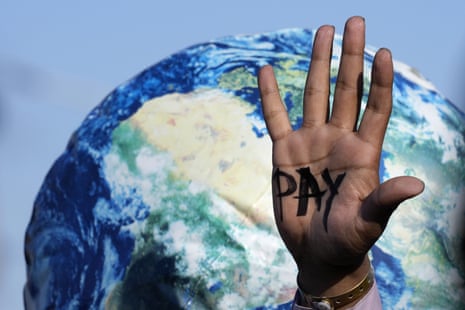
Hemantha Withanage, chair of Friends of the Earth International, said from Sri Lanka: “The decision on carbon markets is deeply worrying. Whilst Cop27 has temporarily delayed moves to put geoengineering, dangerous and untested technologies, and so-called nature-based solutions into carbon offset markets, we know these threats will rear their heads again. Carbon markets give cover for continued emissions by polluters, grabbing of land, forests and water from vulnerable communities, and violations of people’s rights.”
The Global Climate and Health Alliance – a global network of health professionals and NGOs – has also welcomed the decision to establish a loss and damage fund, but are frustrated by the stalled progress on fossil fuel phase-out.
Our heroic Fiona Harvey has just tweeted some pictures from the closing phases of the plenary.
I’m Bibi van der Zee, and I’m just taking over from Alan Evans on the blog now, by the way.






